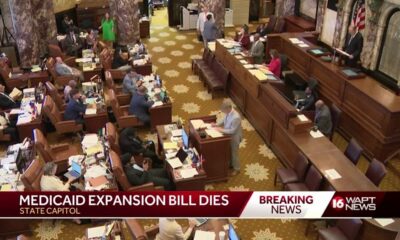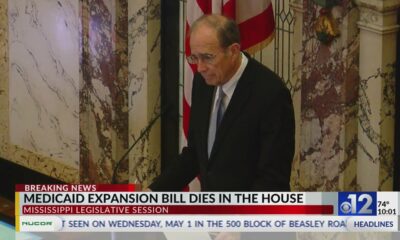Kaiser Health News
Rising Complaints of Unauthorized Obamacare Plan-Switching and Sign-Ups Trigger Concern
Julie Appleby, KFF Health News
Mon, 08 Apr 2024 09:00:00 +0000
Federal and state regulators aren't doing enough to stop the growing problem of rogue health insurance brokers making unauthorized policy switches for Affordable Care Act policyholders, say consumers, agents, nonprofit enrollee assistance groups, and other insurance experts.
“We think it's urgent and it requires a lot more attention and resources,” said Jennifer Sullivan, director of health coverage access for the Center on Budget and Policy Priorities.
The Centers for Medicare & Medicaid Services, which oversees the ACA, “has acknowledged the issue,” said former Oklahoma insurance commissioner John Doak. “But it appears their response is inadequate.”
The reactions follow a KFF Health News article outlining how licensed brokers' easy access to policyholder information on healthcare.gov has led unscrupulous agents to switch people's policies without express permission. Those agents can then take the commission that comes with signing a new customer. Dozens of people and insurance brokers responded to the earlier report recounting similar situations.
Some switched policyholders end up in plans that don't include their doctors or the medications they regularly take, or come with higher deductibles than their original coverage choice. If their income or eligibility for premium tax credits is misrepresented, some people end up owing back taxes.
Agents whose clients have been affected say the switches ramped up last year and are continuing into 2024, although quantifying the problem continues to be difficult. The problem seems concentrated on the federal healthcare.gov website, which is the marketplace where people in 32 states buy ACA plans, which are also known as Obamacare. CMS declined to provide the number of complaints that have been filed.
Even so, CMS representatives said during a December committee meeting of the National Association of Insurance Commissioners that they were “acutely aware” of the problem and were working on solutions.
A similar NAIC gathering was held in March. During those meetings, state regulators urged CMS officials to look for unauthorized switches, rather than reacting only to filed complaints. State regulators also want the agency to tell them sooner about agents or brokers under investigation, and to be provided with the number of affected consumers in their regions.
In an April 4 written statement to KFF Health News, Jeff Wu, acting director of CMS' Center for Consumer Information & Insurance Oversight, pointed to the agency's sharp prohibition on agents enrolling people or changing their plans without getting written or recorded consent, and said his team is “analyzing potential additional system controls to block unauthorized or fraudulent activity.”
It is also working with state regulators and large broker agencies, Wu wrote, to identify “the most effective ways to root out bad actors.” He also said more agents and brokers are being suspended or terminated from healthcare.gov.
Wu did not provide, however, a tally of just how many have been sanctioned.
Low-income consumers are often targeted, possibly because they qualify for zero-premium plans, meaning they might not know they've been switched or enrolled because they aren't paying a monthly bill.
Also, rules took effect in 2022 that allow low-income residents to enroll at any time of the year, not just during the annual open enrollment period. While the change was meant to help people who most need to access coverage, it has had the unintended effect of creating an opportunity for this scheme to ramp up.
“There have been bad apples out there signing people up and capturing the commissions to do so for a while, but it's exacerbated in the last couple of years, turning it from a few isolated incidents to something more common,” said Sabrina Corlette, co-director of the Center on Health Insurance Reforms at Georgetown University.
Many victims don't know they've been switched until they try to use their plans — either because agents changed the policy without talking to them or because the consumer unknowingly enrolled by responding to online advertisements promising gift cards, government subsidies, or free health insurance.
The challenge now is how federal regulators and their counterparts in the states can thwart the activity without diminishing enrollment — a top priority for the marketplace. In fact, Obamacare's record-breaking enrollment figures are being touted prominently in President Joe Biden's reelection campaign.
Thwarting the switches “really comes down to oversight and enforcement,” Corlette said. “As soon as regulators identify someone who is engaged in unauthorized plan-switching or enrollment, they need to cut them off immediately.”
That isn't simple.
For starters, consumers or their agents must report suspected problems to state and federal regulators before investigations are launched.
Such investigations can take weeks and states generally don't have access to complaints until federal investigators finish an inquiry, state regulators complained during the NAIC meetings.
Doak attended the December meeting, where he urged federal regulators to look for patterns that might indicate unauthorized switching — such as policyholders' coverage being changed multiple times in a short period — and then quickly initiate follow-up with the consumer.
“All regulators have a duty to get on top of this issue and protect the most vulnerable consumers from unknowingly having their policies moved or their information mistreated,” Doak told KFF Health News. He is now executive vice president of government affairs for Insurance Care Direct, a health insurance brokerage.
Being more proactive requires funding.
Wu said the agency's administrative budget has remained nearly flat for 13 years even as enrollment has grown sharply in the ACA and the other health programs it oversees.
And the complaint process itself can be cumbersome because it can involve different state or federal agencies lacking coordination.
Even after complaints are filed, state or federal officials follow up directly with the consumer, who might have limited English proficiency, lack an email address, or simply not answer their phone — which can stall or stop a resolution, said Katie Roders Turner, executive director of the Family Healthcare Foundation, a Tampa Bay, Florida, nonprofit that helps people enroll or deal with problems that arise with their plans.
Suggested improvements include creating a central form or portal for complaints and beefing up safeguards on the healthcare.gov site to prevent such unauthorized activity in the first place.
Currently, licensed agents need only a name, date of birth, and state of residence to access policyholder information and make changes. That information is easy to obtain.
States that run their own marketplaces — there are 18 and the District of Columbia — often require more information, such as a one-time passcode sent to the consumer, who then gives it to their chosen agent.
In the meantime, the frustration is increasing.
Lauren Phillips, a sales agent in Georgia, said she reached out to an agent in Florida who was switching one of her clients, asking her to stop. When it happened again to the same client, she reported it to regulators.
“Their solution was for me to just watch the policy and fix it if it happens again, which is not a viable solution, “Phillips said.
Recently, after noticing the client's policy had been switched again, she reported it and changed it back. When she checked two mornings later, the policy had been terminated.
“Now my client has no insurance at all,” Phillips said. “They say they are working on solutions. But here we are in the fourth month of the year and agents and consumers are still suffering at the hands of these terrible agents.”
——————————
By: Julie Appleby, KFF Health News
Title: Rising Complaints of Unauthorized Obamacare Plan-Switching and Sign-Ups Trigger Concern
Sourced From: kffhealthnews.org/news/article/aca-unauthorized-obamacare-plan-switching-concern/
Published Date: Mon, 08 Apr 2024 09:00:00 +0000
Kaiser Health News
KFF Health News’ ‘What the Health?’: Abortion Access Changing Again in Florida and Arizona
Thu, 02 May 2024 19:30:00 +0000
The Host
Julie Rovner
KFF Health News
Julie Rovner is chief Washington correspondent and host of KFF Health News' weekly health policy news podcast, “What the Health?” A noted expert on health policy issues, Julie is the author of the critically praised reference book “Health Care Politics and Policy A to Z,” now in its third edition.
The national abortion landscape was shaken again this week as Florida's six-week abortion ban took effect. That leaves North Carolina and Virginia as the lone Southern states where abortion remains widely available. Clinics in those states already were overflowing with patients from across the region.
Meanwhile, in a wide-ranging interview with Time magazine, former President Donald Trump took credit for appointing the Supreme Court justices who overturned Roe v. Wade, but he steadfastly refused to say what he might do on the abortion issue if he is returned to office.
This week's panelists are Julie Rovner of KFF Health News, Sarah Karlin-Smith of the Pink Sheet, Alice Miranda Ollstein of Politico, and Rachana Pradhan of KFF Health News.
Panelists
Sarah Karlin-Smith
Pink Sheet
Alice Miranda Ollstein
Politico
Rachana Pradhan
KFF Health News
Among the takeaways from this week's episode:
- Florida's new, six-week abortion ban is a big deal for the entire South, as the state had been an abortion haven for patients as other states cut access to the procedure. Some clinics in North Carolina and southern Virginia are considering expansions to their waiting and recovery rooms to accommodate patients who now must travel there for care. This also means, though, that those traveling patients could make waits even longer for local patients, including many who rely on the clinics for non-abortion services.
- Passage of a bill to repeal Arizona's near-total abortion ban nonetheless leaves the state's patients and providers with plenty of uncertainty — including whether the ban will temporarily take effect anyway. Plus, voters in Arizona, as well as those in Florida, will have an opportunity in November to weigh in on whether the procedure should be available in their state.
- The FDA's decision that laboratory-developed tests must be subject to the same regulatory scrutiny as medical devices comes as the tests have become more prevalent — and as concerns have grown amid high-profile examples of problems occurring because they evaded federal review. (See: Theranos.) There's a reasonable chance the FDA will be sued over whether it has the authority to make these changes without congressional action.
- Also, the Biden administration has quietly decided to shelve a potential ban on menthol cigarettes. The issue raised tensions over its links between health and criminal justice, and it ultimately appears to have run into electoral-year headwinds that prompted the administration to put it aside rather than risk alienating Black voters.
- In drug news, the Federal Trade Commission is challenging what it sees as “junk” patents that make it tougher for generics to come to market, and another court ruling delivers bad news for the pharmaceutical industry's fight against Medicare drug negotiations.
Plus, for “extra credit” the panelists suggest health policy stories they read this week that they think you should read, too:
Julie Rovner: ProPublica's “A Doctor at Cigna Said Her Bosses Pressured Her To Review Patients' Cases Too Quickly. Cigna Threatened To Fire Her,” by Patrick Rucker, The Capitol Forum, and David Armstrong, ProPublica.
Alice Miranda Ollstein: The Associated Press' “Dozens of Deaths Reveal Risks of Injecting Sedatives Into People Restrained by Police,” by Ryan J. Foley, Carla K. Johnson, and Shelby Lum.
Sarah Karlin-Smith: The Atlantic's “America's Infectious-Disease Barometer Is Off,” by Katherine J. Wu.
Rachana Pradhan: The Wall Street Journal's “Millions of American Kids Are Caregivers Now: ‘The Hardest Part Is That I'm Only 17,” by Clare Ansberry.
Also mentioned on this week's podcast:
- Time's “How Far Trump Would Go,” by Eric Cortellessa.
- NPR's “Why Is a 6-Week Abortion Ban Nearly a Total Ban? It's About How We Date a Pregnancy,” by Selena Simmons-Duffin.
- NPR's “'Sicko's' Peeno Sees Few Gains in Health Insurance,” by Julie Rovner.
- CNN's “Walmart Will Close All of Its Health Care Clinics,” by Nathaniel Meyersohn.
Credits
Francis Ying
Audio producer
Emmarie Huetteman
Editor
To hear all our podcasts, click here.
And subscribe to KFF Health News' “What the Health?” on Spotify, Apple Podcasts, Pocket Casts, or wherever you listen to podcasts.
——————————
Title: KFF Health News' ‘What the Health?': Abortion Access Changing Again in Florida and Arizona
Sourced From: kffhealthnews.org/news/podcast/what-the-health-345-abortion-access-florida-arizona-may-2-2024/
Published Date: Thu, 02 May 2024 19:30:00 +0000
Kaiser Health News
DIY Gel Manicures May Harm Your Health
Tarena Lofton
Thu, 02 May 2024 09:00:00 +0000
A fresh set from the comfort of your own home? DIY gel nails have been all the rage on social media, but the practice could cause you to develop a life-changing allergy. In a TikTok video, creator @alina.gene describes developing an acrylate allergy from doing gel nails at home. Now, when exposed to acrylates, the creator feels severe pain.
The creator warns viewers not to self-apply nail polish that requires a UV light to cure. In later videos, @alina.gene explains that at-home use differs from in-salon use because salon professionals have access to higher-quality chemicals that are less likely to cause reactions and that they also have proper training on how to safely apply the products.
“I know I sound real dramatic because an allergy to gel nails or even an allergy to acrylates isn't going to kill you, but the thing is, in the wrong situation it could prevent you from getting lifesaving medical care,” said @alina.gene in another video. Common medical products contain acrylates, and developing this allergy can cause major issues in obtaining future medical care.
We asked an allergist to walk us through this viral video.
If you enjoyed this story from the KFF Health News social team, follow us on Instagram @KFFHealthNews.
✍️: KFF Health News Audience Engagement Team
——————————
By: Tarena Lofton
Title: DIY Gel Manicures May Harm Your Health
Sourced From: kffhealthnews.org/news/article/diy-gel-manicures-health-risks/
Published Date: Thu, 02 May 2024 09:00:00 +0000
Did you miss our previous article…
https://www.biloxinewsevents.com/robert-f-kennedy-jr-is-wrong-about-a-ban-on-nih-research-about-mass-shootings/
Kaiser Health News
Robert F. Kennedy Jr. Is Wrong About a Ban on NIH Research About Mass Shootings
Louis Jacobson, PolitiFact
Thu, 02 May 2024 09:00:00 +0000
“Congress prohibits the NIH from researching the cause of mass shootings.”
Robert F. Kennedy Jr. in an April 21 post on X
The National Institutes of Health is the federal government's main agency for supporting medical research. Is it barred from researching mass shootings? That's what presidential candidate Robert F. Kennedy Jr. said recently.
Kennedy, whose statements about conspiracy theories earned him PolitiFact's 2023 “Lie of the Year,” is running as an independent third-party candidate against President Joe Biden, the presumptive Democratic candidate, and the presumptive Republican nominee, former President Donald Trump.
On April 21 on X, Kennedy flagged his recent interview with conservative commentator Glenn Beck, which touched on gun policy. Kennedy summarized his gun policy views in the post, writing, “The National Institutes of Health refuses to investigate the mystery; in fact, Congress prohibits the NIH from researching the cause of mass shootings. Under my administration, that rule ends — and our kids' safety becomes a top priority.”
But this information is outdated.
In 1996, Congress passed the “Dickey Amendment,” an appropriations bill provision that federal officials widely interpreted as barring federally funded research related to gun violence (though some observers say this was a misinterpretation). Congress in 2018 clarified that the provision didn't bar federally funded gun-related research, and funding for such efforts has been flowing since 2020.
Kennedy's campaign did not provide evidence to support his statement.
What Was the Dickey Amendment?
After criticizing some federally funded research papers on firearms in the mid-1990s, pro-gun advocates, including the National Rifle Association, lobbied to halt federal government funding for gun violence research.
In 1996, Congress approved appropriations bill language saying that “none of the funds made available for injury prevention and control at the Centers for Disease Control and Prevention may be used to advocate or promote gun control.” The language was named for one of its backers, Rep. Jay Dickey (R-Ark).
But the Dickey Amendment, as written, did not ban all gun-related research outright.
“Any honest research that was not rigged to produce results that helped promote gun control could be funded by CDC,” said Gary Kleck, a Florida State University criminologist. But CDC officials, experts said, interpreted the Dickey Amendment as banning all gun-related research funding.
This perception meant the amendment “had a chilling effect on funding for gun research,” said Allen Rostron, a University of Missouri-Kansas City law professor who has written about the amendment. Federal agencies “did not want to take a chance on funding research that might be seen as violating the restriction” and so “essentially were not funding research on gun violence.”
Also, the Dickey Amendment targeted only the CDC, not all other federal agencies. Congress expanded the restriction to cover NIH-funded research in 2011.
Although the Dickey Amendment didn't bar gun-related research, federal decision-makers acted as though it did by not pursuing such research.
Moving Past the Dickey Amendment
Over time, critics of the gun industry made an issue of the Dickey Amendment and gathered congressional support to clarify the amendment.
In 2018, lawmakers approved language that said the amendment wasn't a blanket ban on federally funded gun violence research. By 2020, federal research grants on firearms began to be issued again, starting with $25 million to be split between the CDC and NIH.
By now, the CDC and NIH are funding a “large portfolio” of firearm violence-related research, said Daniel Webster, a professor at the Johns Hopkins Bloomberg School of Public Health.
Also, the Justice Department's National Institute of Justice has funded the largest study of mass shootings to date, Webster said, and is seeking applications for studies of mass shootings.
Our Ruling
Kennedy said, “Congress prohibits the NIH from researching the cause of mass shootings.”
Although the Dickey Amendment, a provision of appropriations law supported by the gun industry, didn't prohibit all federally supported, gun-related research from 1996 to 2018, decision-makers acted as though it did.
However, in 2018, Congress clarified the provision's language. And since 2020, CDC, NIH, and other federal agencies have funded millions of dollars in gun-related research, including studies on mass shootings.
We rate Kennedy's statement False.
Our Sources
Robert F. Kennedy Jr. post on X, April 21, 2024
National Institutes of Health, “NIH Awards Additional Research and Training Grants to Support Firearm Injury and Mortality Prevention Science,” Sept. 20, 2023
National Institute of Justice, “Public Mass Shootings: Database Amasses Details of a Half Century of U.S. Mass Shootings with Firearms, Generating Psychosocial Histories,” Feb. 3, 2022
National Institute of Justice, “NIJ FY24 Research and Evaluation on Firearm Violence and Mass Shootings,” Feb. 5, 2024
Centers for Disease Control and Prevention, “Funded Research,” accessed April 22, 2024
American Psychological Association, “A Thaw in the Freeze on Federal Funding for Gun Violence and Injury Prevention Research,” April 1, 2021
Allen Rostron, “The Dickey Amendment on Federal Funding for Research on Gun Violence: A Legal Dissection” (American Journal of Public Health), July 2018
Email interview with Gary Kleck, a Florida State University criminologist, April 22, 2024
Email interview with Daniel W. Webster, professor at the Johns Hopkins Bloomberg School of Public Health, April 22, 2024
Email interview with Jaclyn Schildkraut, executive director of the Regional Gun Violence Research Consortium at the Rockefeller Institute of Government, April 22, 2024
Email interview with Mike Lawlor, University of New Haven criminologist, April 22, 2024
Email interview with Allen Rostron, University of Missouri-Kansas City law professor, April 22, 2024
KFF Health News is a national newsroom that produces in-depth journalism about health issues and is one of the core operating programs at KFF—an independent source of health policy research, polling, and journalism. Learn more about KFF.
USE OUR CONTENT
This story can be republished for free (details).
——————————
By: Louis Jacobson, PolitiFact
Title: Robert F. Kennedy Jr. Is Wrong About a Ban on NIH Research About Mass Shootings
Sourced From: kffhealthnews.org/news/article/fact-check-rfk-jr-wrong-nih-research-mass-shootings-gun-control-dickey-amendment/
Published Date: Thu, 02 May 2024 09:00:00 +0000
Did you miss our previous article…
https://www.biloxinewsevents.com/breaking-a-promise-california-deficit-could-halt-raises-for-disability-workers/
-
Mississippi Today5 days ago
On this day in 1951
-
Mississippi News6 days ago
One injured in Mississippi officer-involved shooting after chase
-
SuperTalk FM3 days ago
Festival merger in Leland sets up one major event for Mississippi Delta
-
SuperTalk FM4 days ago
PERS bill set to phase in employer rate increase heads to governor’s desk
-
Mississippi Business2 days ago
Geartek expanding operations in Alcorn County
-
Mississippi News3 days ago
Two women accused of shoplifting across southeast captured in Mississippi
-
SuperTalk FM6 days ago
Investigation underway after gun found in backpack of Ridgeland High School student
-
SuperTalk FM11 hours ago
Driver’s education set to become mandatory in Mississippi as bill passes





































